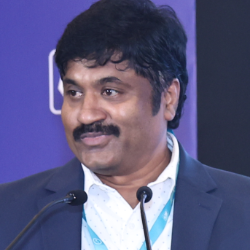SC8: Generative and Predictive AI Modeling for Designing Small Molecule and Peptide Drugs
Drug discovery has always been experimenting with new approaches to find novel molecules with desirable properties. Currently, we are witnessing three approaches in the spotlight. The first one is a new set of AI techniques for designing and predicting in silico molecules. The next trend is exploring the massive search space of biomolecules and designing peptides with desirable properties. The third trend is the emergence of new therapeutic modalities. That is, instead of traditional inhibitors, we can now design molecular glues and PROTACs as target degraders. With these recent developments, this course will cover various AI techniques applied in generative and predictive models for small molecule and peptide drug design.
Parthiban Srinivasan, PhD, Professor, Data Science and Engineering, Indian Institute of Science Education and Research, Bhopal
Stephanie Ashenden, PhD, Senior Informatician, Artificial Intelligence & Machine Learning, AstraZeneca
Victor Guallar, PhD, Professor, Barcelona Supercomputing Center and Nostrum Biodiscovery
Nicholas Nystrom, PhD, CTO, Peptilogics, Inc.
INSTRUCTOR BIOGRAPHIES:
 Parthiban Srinivasan, PhD, Professor, Data Science and Engineering, Indian Institute of Science Education and Research, Bhopal
Parthiban Srinivasan, PhD, Professor, Data Science and Engineering, Indian Institute of Science Education and Research, Bhopal
Parthiban Srinivasan, an experienced data scientist, earned his PhD from Indian Institute of Science, specializing in Computational Chemistry. After his PhD, he continued the research at NASA Ames Research Center (USA) and Weizmann Institute of Science (Israel). Then he worked at AstraZeneca in the area of Computer Aided Drug Design for Tuberculosis. Later, he headed informatics business units in Jubilant Biosys and then in GvkBio before he floated the company, Parthys Reverse Informatics and later an AI consultancy, Vingyani. Currently, he is a Professor at Indian Institute of Science Education and Research (IISER) Bhopal, teaching Data Science.
 Stephanie Ashenden, PhD, Senior Informatician, Artificial Intelligence & Machine Learning, AstraZeneca
Stephanie Ashenden, PhD, Senior Informatician, Artificial Intelligence & Machine Learning, AstraZeneca
 Victor Guallar, PhD, Professor, Barcelona Supercomputing Center and Nostrum Biodiscovery
Victor Guallar, PhD, Professor, Barcelona Supercomputing Center and Nostrum Biodiscovery
Currently an ICREA Professor at the Barcelona Supercomputing Center (BSC), Dr. Guallar completed his PhD in theoretical Chemistry between the University Autonomous of Barcelona (Spain) and UC Berkeley (USA) in January 2000. After three years as a postdoctoral researcher at Columbia University (New York, USA), he was appointed assistant professor at Washington University School of Medicine (St Louis, USA), before moving his group to BSC in 2006. His laboratory (EAPM) has grown considerably since, keeping a productive international character, and developing important contributions in computational biophysics, such as the protein-ligand modeling software PELE, and biochemistry, including computational algorithms for enzyme engineering and the introduction of the first PluriZyme (enzyme with multiple actives sites).As a BSC researcher, Prof. Guallar has been awarded several important research projects, including the award of a prestigious advanced ERC grant (the youngest researcher to receive it in Spain). His research has produced over 140 papers in international journals and directed 16 PhD thesis. In addition to algorithms development (and their application), the group has recently placed importance in adding interdisciplinary fields to our research, such as visualization techniques, data mining and software optimization through machine learning algorithms. Prof. Guallar is also founder of the first spin off from BSC, Nostrum Biodiscovery, a young biotech enterprise created in 2016 which aims to collaborate with pharmaceutical and biotech companies dedicated to the development of drugs and molecules of biotechnological interest. The company currently works with clients in North America, Europe, Asia, and Oceania.
 Nicholas Nystrom, PhD, CTO, Peptilogics, Inc.
Nicholas Nystrom, PhD, CTO, Peptilogics, Inc.
Nicholas Nystrom, PhD, is CTO at Peptilogics, where he leads development of the Nautilus generative AI platform for peptide drug design. Nautilus integrates generative and predictive algorithms, computational biophysics and quantum chemistry, and in-house, custom-designed supercomputing to enable peptide drug design. Nick’s areas of expertise include machine learning, drug discovery, computer architecture, computational science, and quantum chemistry. Prior to joining Peptilogics, Nick was Chief Scientist at the Pittsburgh Supercomputing Center, where he architected the first supercomputer to converge AI and HPC. Nick designed and was PI for national supercomputers including Blacklight, Bridges, and Bridges-2, and he codesigned the Neocortex supercomputer to enable scaling AI on the world’s most powerful accelerators. Nick was PI for the Human BioMolecular Atlas Program (HuBMAP), an NIH Common Fund project that is developing a map of the human body at single-cell resolution, spanning genomic, proteomic, and imaging modalities. Nick also led research in AI for breast and lung cancer and causal discovery focusing on cancer driver mutations, lung fibrosis, and the brain causome. His PhD is in quantum chemistry.